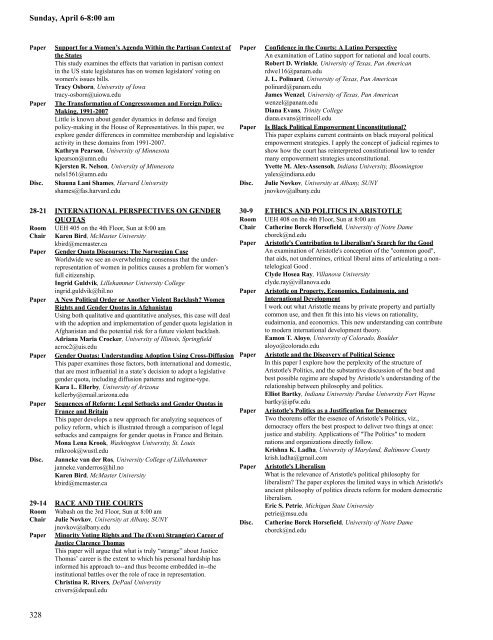2008 Conference Program - Midwest Political Science Association
2008 Conference Program - Midwest Political Science Association
2008 Conference Program - Midwest Political Science Association
You also want an ePaper? Increase the reach of your titles
YUMPU automatically turns print PDFs into web optimized ePapers that Google loves.
Sunday, April 6-8:00 am<br />
Paper<br />
Paper<br />
Disc.<br />
Support for a Women’s Agenda Within the Partisan Context of<br />
the States<br />
This study examines the effects that variation in partisan context<br />
in the US state legislatures has on women legislators' voting on<br />
women's issues bills.<br />
Tracy Osborn, University of Iowa<br />
tracy-osborn@uiowa.edu<br />
The Transformation of Congresswomen and Foreign Policy-<br />
Making, 1991-2007<br />
Little is known about gender dynamics in defense and foreign<br />
policy-making in the House of Representatives. In this paper, we<br />
explore gender differences in committee membership and legislative<br />
activity in these domains from 1991-2007.<br />
Kathryn Pearson, University of Minnesota<br />
kpearson@umn.edu<br />
Kjersten R. Nelson, University of Minnesota<br />
nels1561@umn.edu<br />
Shauna Lani Shames, Harvard University<br />
shames@fas.harvard.edu<br />
Paper<br />
Paper<br />
Disc.<br />
Confidence in the Courts: A Latino Perspective<br />
An examination of Latino support for national and local courts.<br />
Robert D. Wrinkle, University of Texas, Pan American<br />
rdwe116@panam.edu<br />
J. L. Polinard, University of Texas, Pan American<br />
polinard@panam.edu<br />
James Wenzel, University of Texas, Pan American<br />
wenzel@panam.edu<br />
Diana Evans, Trinity College<br />
diana.evans@trincoll.edu<br />
Is Black <strong>Political</strong> Empowerment Unconstitutional<br />
This paper explains current contraints on black mayoral political<br />
empowerment strategies. I apply the concept of judicial regimes to<br />
show how the court has reinterpreted constitutional law to render<br />
many empowerment strategies unconstitutional.<br />
Yvette M. Alex-Assensoh, Indiana University, Bloomington<br />
yalex@indiana.edu<br />
Julie Novkov, University at Albany, SUNY<br />
jnovkov@albany.edu<br />
28-21 INTERNATIONAL PERSPECTIVES ON GENDER<br />
QUOTAS<br />
Room UEH 405 on the 4th Floor, Sun at 8:00 am<br />
Chair Karen Bird, McMaster University<br />
kbird@mcmaster.ca<br />
Paper Gender Quota Discourses: The Norwegian Case<br />
Worldwide we see an overwhelming consensus that the underrepresentation<br />
of women in politics causes a problem for women’s<br />
full citizenship.<br />
Ingrid Guldvik, Lillehammer University College<br />
ingrid.guldvik@hil.no<br />
Paper A New <strong>Political</strong> Order or Another Violent Backlash Women<br />
Rights and Gender Quotas in Afghanistan<br />
Using both qualitative and quantitative analyses, this case will deal<br />
with the adoption and implementation of gender quota legislation in<br />
Afghanistan and the potential risk for a future violent backlash.<br />
Adriana Maria Crocker, University of Illinois, Springfield<br />
acroc2@uis.edu<br />
Paper Gender Quotas: Understanding Adoption Using Cross-Diffusion<br />
This paper examines those factors, both international and domestic,<br />
that are most influential in a state’s decision to adopt a legislative<br />
gender quota, including diffusion patterns and regime-type.<br />
Kara L. Ellerby, University of Arizona<br />
kellerby@email.arizona.edu<br />
Paper Sequences of Reform: Legal Setbacks and Gender Quotas in<br />
France and Britain<br />
This paper develops a new approach for analyzing sequences of<br />
policy reform, which is illustrated through a comparison of legal<br />
setbacks and campaigns for gender quotas in France and Britain.<br />
Mona Lena Krook, Washington University, St. Louis<br />
mlkrook@wustl.edu<br />
Disc. Janneke van der Ros, University College of Lillehammer<br />
janneke.vanderros@hil.no<br />
Karen Bird, McMaster University<br />
kbird@mcmaster.ca<br />
29-14 RACE AND THE COURTS<br />
Room Wabash on the 3rd Floor, Sun at 8:00 am<br />
Chair Julie Novkov, University at Albany, SUNY<br />
jnovkov@albany.edu<br />
Paper Minority Voting Rights and The (Even) Strang(er) Career of<br />
Justice Clarence Thomas<br />
This paper will argue that what is truly “strange” about Justice<br />
Thomas’ career is the extent to which his personal hardship has<br />
informed his approach to--and thus become embedded in--the<br />
institutional battles over the role of race in representation.<br />
Christina R. Rivers, DePaul University<br />
crivers@depaul.edu<br />
30-9 ETHICS AND POLITICS IN ARISTOTLE<br />
Room UEH 408 on the 4th Floor, Sun at 8:00 am<br />
Chair Catherine Borck Horsefield, University of Notre Dame<br />
cborck@nd.edu<br />
Paper Aristotle's Contribution to Liberalism's Search for the Good<br />
An examination of Aristotle's conception of the "common good",<br />
that aids, not undermines, critical liberal aims of articulating a nontelelogical<br />
Good .<br />
Clyde Hosea Ray, Villanova University<br />
clyde.ray@villanova.edu<br />
Paper Aristotle on Property, Economics, Eudaimonia, and<br />
International Development<br />
I work out what Aristotle means by private property and partially<br />
common use, and then fit this into his views on rationality,<br />
eudaimonia, and economics. This new understanding can contribute<br />
to modern international development theory.<br />
Eamon T. Aloyo, University of Colorado, Boulder<br />
aloyo@colorado.edu<br />
Paper Aristotle and the Discovery of <strong>Political</strong> <strong>Science</strong><br />
In this paper I explore how the perplexity of the structure of<br />
Aristotle's Politics, and the substantive discussion of the best and<br />
best possible regime are shaped by Aristotle’s understanding of the<br />
relationship between philosophy and politics.<br />
Elliot Bartky, Indiana University Purdue University Fort Wayne<br />
bartky@ipfw.edu<br />
Paper Aristotle's Politics as a Justification for Democracy<br />
Two theorems offer the essence of Aristotle’s Politics, viz.,<br />
democracy offers the best prospect to deliver two things at once:<br />
justice and stability. Applications of "The Politics" to modern<br />
nations and organizations directly follow.<br />
Krishna K. Ladha, University of Maryland, Baltimore County<br />
krish.ladha@gmail.com<br />
Paper Aristotle's Liberalism<br />
What is the relevance of Aristotle's political philosophy for<br />
liberalism The paper explores the limited ways in which Aristotle's<br />
ancient philosophy of politics directs reform for modern democratic<br />
liberalism.<br />
Eric S. Petrie, Michigan State University<br />
petrie@msu.edu<br />
Disc. Catherine Borck Horsefield, University of Notre Dame<br />
cborck@nd.edu<br />
328










